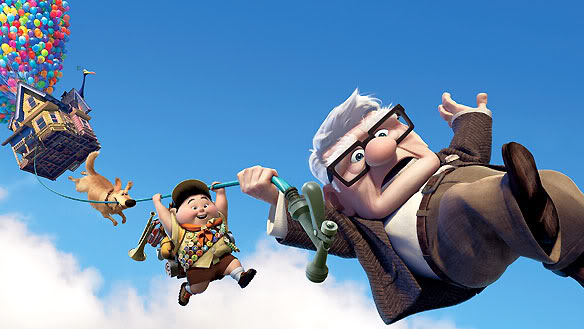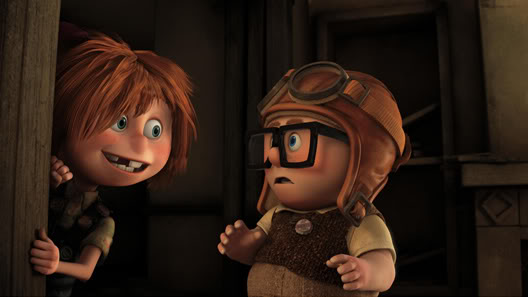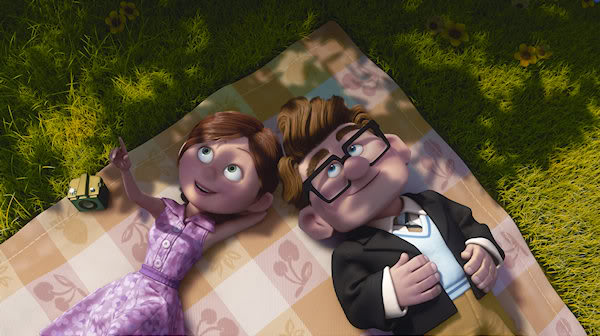It’s one of those rules you learn in screenwriting courses: don’t front-load your tale with your Hero’s backstory. Sure, you the author need to know it, but don’t explain it all up front. Get on with your story, and explain it later, in little bits and pieces. Write it out for yourself if you need to, but don’t stick it in the actual story in one piece. My friend Blake Snyder calls this “Act Zero”. Most of the time you do not need to explain the backstory before you begin the adventure.
And then, there is Disney-Pixar’s Up.
 Let us be clear: the story-adventure of Up actually begins when Russell shows up on Carl’s doorstep insisting he has to help the elderly man. That is Carl’s Call to Adventure, and he’s not having any of it. (His Refusal of the Call makes for a bit of comedy: he sends the kid on a snipe hunt.) That is, structurally speaking, where the story starts.
Let us be clear: the story-adventure of Up actually begins when Russell shows up on Carl’s doorstep insisting he has to help the elderly man. That is Carl’s Call to Adventure, and he’s not having any of it. (His Refusal of the Call makes for a bit of comedy: he sends the kid on a snipe hunt.) That is, structurally speaking, where the story starts.
So, that wonderful, poignant stuff that went before that moment, what was that?
Backstory. Act Zero.
Usually, we do not have to see that backstory up-front. But let’s consider why we need it for this story.
The Hero’s Journey (and Carl is our Hero in this story) begins in the Hero’s Ordinary World (or his Old World). Usually, something needs to be changed, and he ventures out from that world. But in Up, if the presentation of the story really did start with Russell at the door, what follows would still be entertaining and engaging (crusty old man learns to care about someone while on a wild adventure), but it would not have the depth of meaning that Up possesses. We actually do need to see this Act Zero.
First off, we see that Young Carl is almost exactly like the young Russell we will shortly meet. He dreams of adventure, but his scope is small. Until he meets Young Ellie. In the boisterous Ellie, he meets someone who startles and entrances him with her active response to the call of adventure.
 Of course they fall in love. Their enjoyment of each other is its own adventure. Their dream of a real adventure is a shared dream, but not the real glue of their lives (though it will take Carl a while to understand that).
Of course they fall in love. Their enjoyment of each other is its own adventure. Their dream of a real adventure is a shared dream, but not the real glue of their lives (though it will take Carl a while to understand that).
 It is important for us to know that Carl is capable of love and that he does understand the call of adventure that has a hold on Russell. And that we are given the chance to love Ellie too, this gives us the powerful gift of wanting Carl’s adventure to succeed. We connect with the forces that drive him on, in a very powerful way.
It is important for us to know that Carl is capable of love and that he does understand the call of adventure that has a hold on Russell. And that we are given the chance to love Ellie too, this gives us the powerful gift of wanting Carl’s adventure to succeed. We connect with the forces that drive him on, in a very powerful way.
The storytellers use Act Zero to also set up the Opponent, and very nicely compact it with Carl’s youthful hero worship of Muntz. Because that hero worship is something we understand, it adds a poignant bite when Carl learns his Hero is no hero. Carl has to be his own Hero.
Up is one occasion where the storytellers present at length how the Hero’s Ordinary World became what it is. And unusual as that is, they made it work — basically by giving it its own three-act structure and telling it swiftly, without over-dwelling on it. Beautifully done and perfectly structured. (Warning: these storytellers are trained professionals, so “don’t do this at home.” Remember, Up is an exception when it comes to revealing the backstory.)
[Pictures are property of Disney-Pixar.]
For more on the Hero’s Ordinary (or Old) World, read The Scribbler’s Guide to the Land of Myth.
